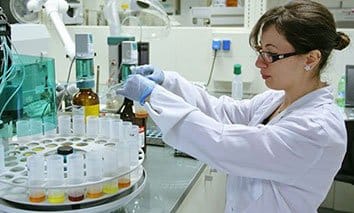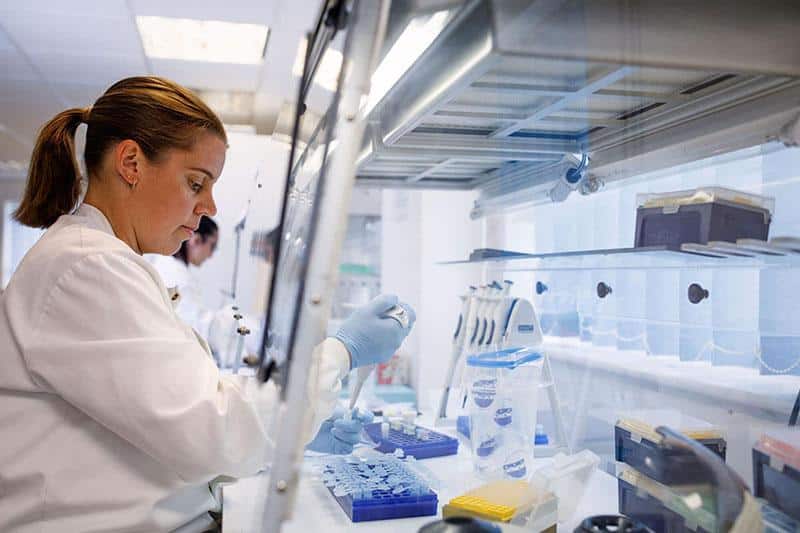Laboratory Science Background
Potential Job Roles and Salaries
What kind of roles would I be suitable for based on my science/lab background?
If your current or previous job was in lab/science, biochemistry, molecular biology, chemistry, microbiology or biotechnology, you could retrain to perform the SAME OR SIMILAR job within the pharmaceutical or medical device manufacturing industry.
Here are some of the typical roles and the expected salaries:
Biochemist
Scientific professionals who study and explore the chemical processes with biological organisms. Within the pharmaceutical industry, biochemists are employed within research and development departments as well as within quality teams in manufacturing departments.
- Starting Salary: €35,000 to €45,000
- After 3 Years: €45,000 to €55,000
- After 5 Years: €55,000 to €65,000
- Starting Salary: $78,744
- After 2 Years: $98,180
- After 5 Years: $117,616
Laboratory Technician
Assist industry scientists in their research and testing. This can involve a number of different tasks and these tasks can vary greatly between roles. Within the pharmaceutical industry, laboratory technicians can be employed in research and development or in production and manufacturing. As a result, the work can be based in a laboratory or on a production line, depending on the specific responsibilities of the role.
- Starting Salary: €30,000 to €32,000
- After 3 Years: €32,000 to €35,000
- After 5 Years: €35,000 to €40,000
- Starting Salary: $44,816
- After 2 Years: $55,770
- After 5 Years: $66,724
Microbiologist
A scientific professional who studies microorganisms. They play a key role in pharmaceutical or medical device manufacturing by testing to monitor levels of microbial contamination at all stages of the manufacturing process.
- Starting Salary: €35,000 to €45,000
- After 3 Years: €45,000 to €55,000
- After 5 Years: €55,000 to €65,000
- Starting Salary: $70,480
- After 2 Years: $87,850
- After 5 Years: $10,520
References
- Bureau of Labor Statistics NAICS 325400 – Pharmaceutical and Medicine Manufacturing – May 2021 Estimates
Salaries are calculated as 80%, 100% and 120% of BLS averages.
Laboratory Science, Biochemistry, Molecular Biology, Chemistry, Microbiology or Biotechnology background?
Take our “Conversion Course into Pharma for Scientists” to work in quality assurance, quality control, development or science roles that support manufacturing.
Ideal for:
- anyone with a lab/science, biochemistry, molecular biology, chemistry, microbiology or biotechnology background
…who want: to work in quality control, quality assurance roles or science roles in development or that support manufacturing in the pharmaceutical manufacturing industry
Duration: 15 weeks
Delivery: Completely ONLINE with weekly deliverables and progress checks
Hours per week: 14
Awarding body: GetReskilled
Available Jobs
Irish Pharmaceutical Jobs Board
Check out the Irelands largest pharmaceutical and medical device jobs board and see what jobs are available.
Check now for open positions. Irish Pharma Jobs Board
UK Pharmaceutical Jobs Board
Check out the UK’s largest jobs board focused exclusively on the pharmaceutical and medical device sector and see what jobs are available.
Check now for open positions. UK Pharma Jobs Board
What Type of Jobs Can Scientists & Science Graduates Get in the Pharma Industry?
The specific opportunities will depend on the company and what they’re manufacturing, but there are some general guidelines you can follow to make your search a little easier.
Our number one piece of advice is to read job adverts.
Until you really get to grips with industry opportunities, don’t discount jobs based on their title alone. Even jobs that sound kind of niche often have some flexibility around degree subject and experience level required. Science roles in pharma are often more about the skills you have than the title of your degree.
But for specialist advice based on your degree subject, click on one of the links below:



